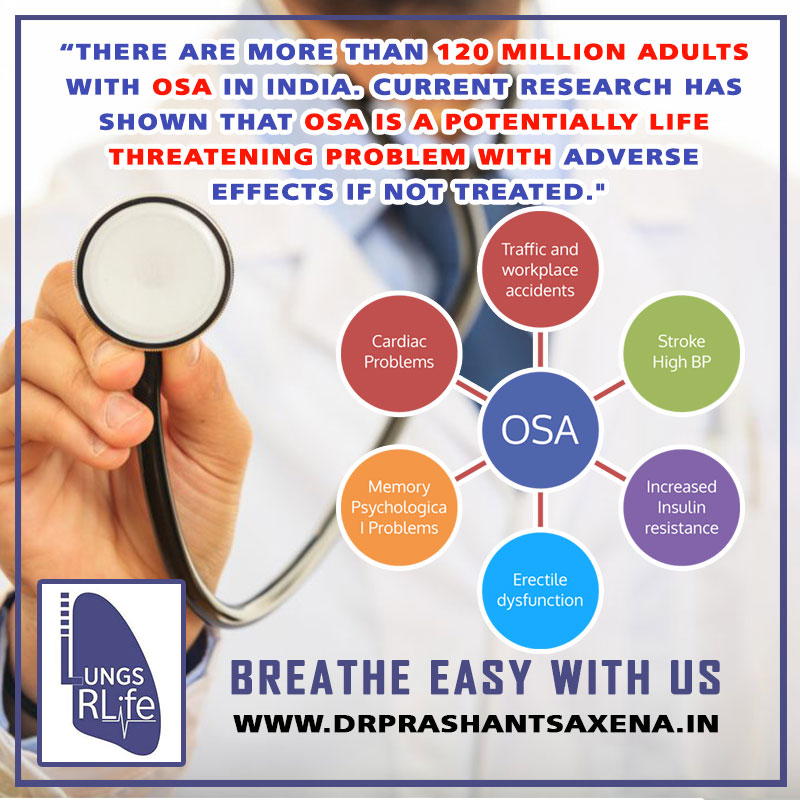Sleep Apnea

What is sleep apnea ?
People living with undiagnosed sleeping disorder, medically known as obstructive sleep apnea (OSA), can suffer various adverse effects of the condition such as increased risk of high blood pressure, diabetes, heart attacks, brain strokes and motor car driving accidents.
“There are more than 120 million adults with OSA in India. Children are also at high risk. A majority of the cases are undiagnosed and remain untreated. Current research has shown that OSA is a potentially life threatening with adverse effects if not treated .
What are the warning signs of OSA ?
Excessively loud snoring which can be heard rooms away (or even by neighbors).
A pattern of snoring interrupted by pauses, then gasps, is a sign that breathing stops and restarts. Occasionally, patients will remember waking up short of breath or gasping, although the vast majority of episodes are not recalled.
Falling asleep at the wrong times, such as at work or while driving.
Trouble concentrating, or becoming forgetful, irritable, anxious, or depressed.
Morning headaches or nausea, frequent trips to the bathroom to urinate at night, and loss of interest in sex. Men may complain of impotence and women may have menstrual irregularities.
These problems usually appear slowly and progress over many years, so that the patient may not recognize the symptoms. Sometimes the patient thinks the symptoms are just from getting older or are not serious. Family members, employers or coworkers may be the first to recognize a pattern of excessive sleepiness and/or changes in mood or behavior, and should encourage a visit to a healthcare professional.
What happens if I am not treated for OSA ?
The most common complaint of people with OSA is excessive sleepiness. The sleepiness is most often felt when the person with OSA is sitting still or not active, either physically or mentally. He or she may be unable to remain awake or to concentrate while reading or watching TV, even if they are interested in the material. Driving an automobile can often be difficult because of unwanted sleep, and people with OSA have more automobile accidents due to dozing or inattention. Untreated OSA has other consequences for health and well-being besides sleepiness. These include increased risk of developing high blood pressure, diabetes, heart attacks, stroke etc.
Medical science is learning that treatment of OSA can reduce or eliminate these risks. In many cases, the patient feels the benefits, such as reduced sleepiness and better mood, quickly after treatment begins
If you are diagnosed with OSA you may benefit from both general measures and specific treatments. General measures
Weight loss may help in the treatment of OSA if you are overweight. Even small amounts of weight loss- 10 kg in a 100 kg – may improve breathing during sleep, making sleep more restful and lessening daytime sleepiness.
Avoid alcohol within four hours of bedtime. Alcohol depresses breathing and makes OSA episodes more frequent and severe. Alcohol also appears to trigger OSA in people who would otherwise merely snore.
Avoid sleeping pills. Sleeping pills may also depress breathing, relax the muscles of the throat, and generally make OSA worse. Seek out a healthcare professional’s advice if you use sleeping pills and have OSA.
Take all drugs with care. Medications prescribed for headaches, anxiety and other common problems can affect sleep and breathing.
Sleep lying on one side or your stomach. Some people suffer from OSA only when lying on their backs. Pillows placed behind the back or a tennis ball attached to the back or pajamas will prevent back-sleeping throughout the night.
Medications to relieve nasal stuffiness may be helpful in reducing snoring and may help OSA slightly. Mechanical nasal dilators and similar devices available at drug stores can also be used to reduce nasal obstruction.